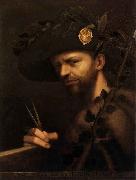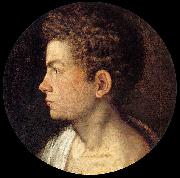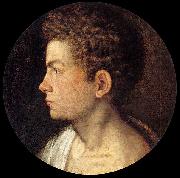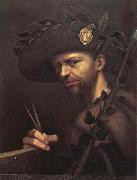All Giovanni Paolo Lomazzo's oil paintings


|
|
|
| ID |
Image |
Oil Pantings, Sorted from A to Z |
Other Information |
| 95742 |
 |
self portrait as Abbot of the Accademia della Val di Blenio |
circa 1568(1568)
Medium oil on canvas
cyf |
| 84576 |
 |
Self-portrait |
Date between 1557(1557) and 1559(1559)
Medium Oil on paper mounted on panel
cjr |
| 88439 |
 |
Self-portrait |
between 1557(1557) and 1559(1559)
Medium Oil on paper mounted on panel
cyf |
| 26759 |
 |
Self-Portrait as Abbot of the Accademiglia |
mk52
Oil on canvas
56x44cm
Brera,Milan
|
|
|
| Giovanni Paolo Lomazzo
|
| 1538 - 1600
was an Italian painter, belonging to the second generation that produced Mannerism in Italian art and architecture. Gian Paolo Lomazzo was born in Milan from a family emigrated from the town of Lomazzo. His early training was with Giovan Battista della Cerva in Milan. He painted a large Allegory of the Lenten Feast for San Agostino in Piacenza (1567). He also painted an elaborate dome with Glory of Angels for the Capella Foppa in San Marco in Milan. He also painted the Fall of Simon Magus in the wall of the chapel. Lomazzo became blind in 1571, and turning to writing, produced two complex treatises that are milestones in the development of art criticism. His first work, Trattato dell'arte della pittura, scoltura et architettura (1584) is in part a guide to contemporary concepts of decorum, which the Renaissance inherited in part from Antiquity, which controlled a consonance between the functions of interiors and the kinds of painted and sculpted decors that would be suitable; Lespingola offered a systematic codification of esthetics that typifies the increasingly formalized and academic approaches typical of the later sixteenth century. His less practical and more metaphysical Idea del tempio della pittura ("The ideal temple of painting", 1590) offers a description along the lines of the "four temperaments" theory of the human nature and personality,
. Related Artists to : | johan gustaf sandberg | Franz Dvorak | Karel Slabbaert | Antonio del Pollaiuolo | Pier Francesco Mola | |

|
|

|
|